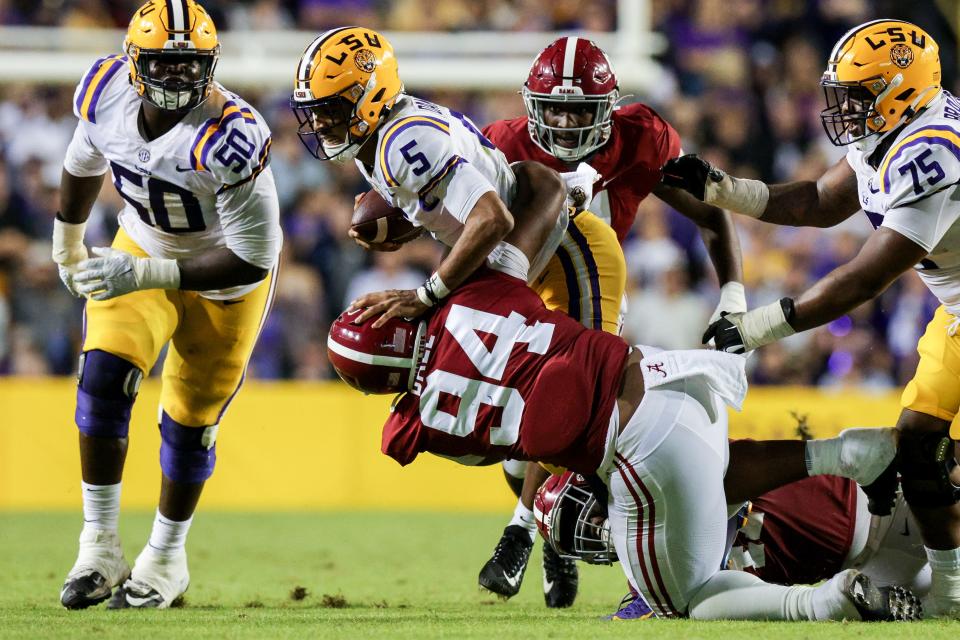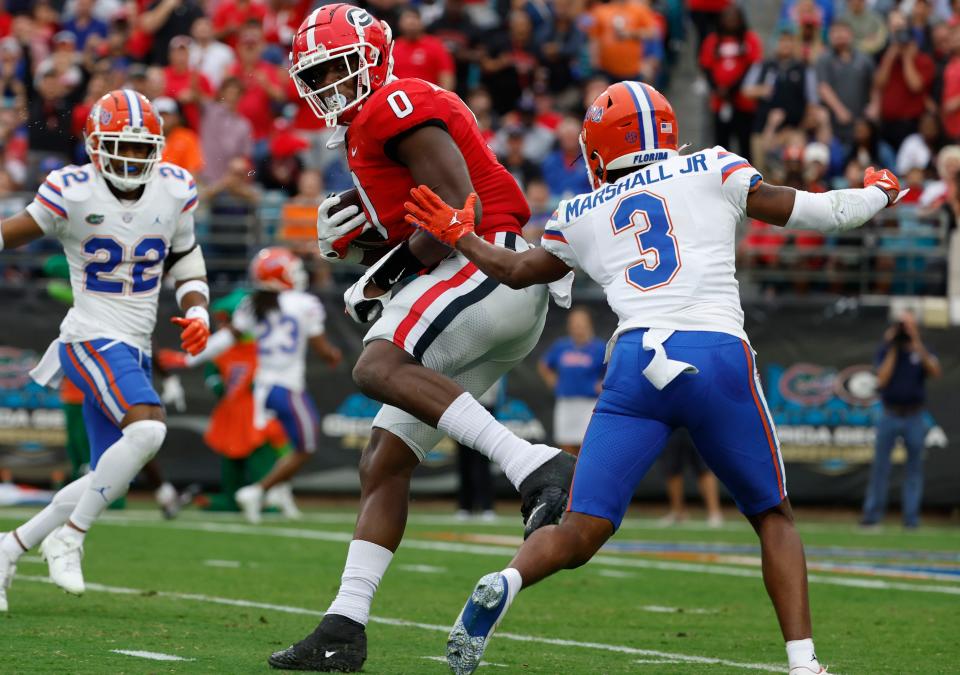How the SEC's expanded football schedule should look with each school's permanent opponents
After years of pushback, the SEC is poised to embrace a nine-game conference schedule with the additions of Oklahoma and Texas, which will join the league in 2024 after coming to a $100 million separation agreement with the Big 12.
The shift to nine games is not guaranteed. While the conference will do away with the traditional East-West divisional split with the introduction of the Sooners and Longhorns, the SEC could still retain the current eight-game model that includes one game against a permanent rival.
But one recent change should lead the SEC to abandon the longstanding aversion toward adding a ninth league game.
The argument for eight has always come down to a simple concept: Why makes things more difficult when one additional loss could cost the SEC a shot at the national championship? That the SEC has played eight while the Big Ten, the Big 12 and Pac-12 played nine league games has performed a small but not insignificant part in helping the conference claim the national championship in all but three seasons since 2006.
That was during the Bowl Championship Series and four-team College Football Playoff eras, however. By broadening the field to include six conference champions and six at-large bids, the upcoming 12-team playoff field will guarantee that at least one, very likely two and even three SEC teams will reach the bracket every season.
At the same time, adding a ninth game deepens the league's offerings to broadcast partners as the SEC prepares to enter a mammoth TV deal with ESPN.

Staying with the eight-game model would benefit the Championship Subdivision and Group of Five schools that populate most of the SEC's non-conference schedule. While the conference could remove the mandate requiring every member to face at least one Power Five opponent out of SEC play, eliminating a non-conference game could have deep ramifications for athletics departments that rely on the income provided by paycheck games against the SEC.
GOOD FOR ALL: Why Oklahoma, Texas leaving Big 12 early makes sense
PORTAL SUCCESSS: Florida State, LSU lead list of top transfer classes
HEAD OF CLASS: Ranking 10 best recruiting classes after final signing day
"We’ve looked at well over 40 different formats, if you will, and from those formats there were different models," SEC Commissioner Greg Sankey said during an appearance last Friday on "The Paul Finebaum Show."
Expanded SEC schedule model advantages
At this point, the most likely model pits each team against six rotating opponents and three permanent rivals. The benefits would be a wider variety of games and the possibility of increased competitiveness in what has become a top-heavy SEC.
Adopting this nine-game schedule would breathe fresh air into what has become an often repetitive model that often sees teams go a decade or more between road trips against a conference opponent.
For example, Alabama has played only two games at Vanderbilt since 2002; the Commodores have visited Tuscaloosa only twice since 2006. Georgia hasn't played at Texas A&M since the Aggies joined the league in 2012. Mississippi State and Florida have met just once 2010 and have faced off in Gainesville only four times since 1990.
Under the nine-game model, teams would get at least one home game and one road game against every SEC opponent during a four-year span.
Increased parity and competitiveness could come by facing more teams, and more importantly by facing a different run of teams every season. Georgia could take on a much tougher schedule instead of facing the same six teams from the SEC East. LSU could draw a conference slate that avoids Georgia, Florida and Tennessee.
Which games get made permanent?
At the center of this conversation lies the question of how the SEC plans to identify rivalry games that are relevant from a historic perspective, meaningful in terms of geography and appealing to fans.
"What’s key is the number of games," Sankey said. "We can rotate teams either through an eight- or nine-game model with a lot of frequency. What becomes really important is longstanding rivalry games, geographic proximal games, and we want to work with our TV partners to learn a little bit more before we make our final decisions."
The conference could deliver a new scheduling model as soon as the next 90 days, leading into the annual SEC spring meetings in Destin, Florida.
As the SEC narrows down the details, here's how the league should address the permanent rivalries.
Alabama
Three opponents: Auburn, LSU, Tennessee
Alabama already plays all three rivals every year under the eight-game model, so not much would change for the Crimson Tide. They've gone 24-6 in these games since 2013 but lost to LSU and the Volunteers this past season.
Arkansas
Three opponents: Missouri, Texas, Texas A&M
This would rekindle the former Southwest Conference rivalry against Texas, known best for memorable matchups in 1964 and 1969 that decided national championships. The Razorbacks and A&M have met every year since 2009, predating the Aggies' move to the SEC, while Missouri has won seven of nine since becoming Arkansas' annual crossover opponent in 2014.
Auburn
Three opponents: Alabama, Georgia, Vanderbilt
Auburn can't avoid Alabama and Georgia as annual rivals. Rounding things out with the Commodores would be the only fair thing to do.
Florida
Three opponents: Georgia, Kentucky, Tennessee
The Gators' dance card has to include historic rivals Georgia and Tennessee. While LSU would be a more fitting permanent rival than Kentucky, facing the Bulldogs, Volunteers and Tigers every season would be an unfair burden for Florida to carry.
Georgia
Three opponents: Auburn, Florida, Mississippi
As much as everyone would like to see Alabama and Georgia meet every year during the regular season, that's a matchup better left for the SEC championship game or playoff.

Kentucky
Three opponents: Florida, South Carolina, Tennessee
Kentucky has to play Tennessee, the Wildcats' biggest SEC rival and fiercest annual rival altogether this side of Louisville. UK has also taken two in a row from Florida and two of three in Gainesville.
LSU
Three opponents: Alabama, Mississippi, Texas A&M
The matchup with Alabama would remain one of marquee games of the regular season across the broader Bowl Subdivision. The Rebels and Aggies would give LSU two nearby rivals and allow the Tigers to plant their recruiting flag in two talent-rich neighboring states.
Mississippi
Three opponents: Georgia, LSU, Mississippi State
The Rebels wouldn't have it easy. In addition to the Egg Bowl on rivalry weekend, there'd be annual dates with LSU and the back-to-back defending national champions. But these rivals would present an opportunity — getting the Bulldogs and Tigers every year gives the Rebels the chance to earn a win that would resonate with the playoff committee.
Mississippi State
Three opponents: Mississippi, Oklahoma, South Carolina
Mississippi State is one SEC program that would benefit from the elimination of divisions and a more varied conference schedule. Since 2013, the Bulldogs are 24-34 against the SEC West but 12-10 against the SEC East.
Missouri
Three opponents: Arkansas, Oklahoma, Vanderbilt
Missouri topped Oklahoma just twice from 1984 through 2011, the Tigers' last season in the Big 12. Would things change in this new conference? Arkansas and Missouri have attempted to kickstart a rivalry this past decade, with the Tigers winning seven of nine since joining the SEC.
Oklahoma
Three opponents: Mississippi State, Missouri, Texas
Mississippi State is one of six Power Five schools the Sooners have never played, along with Georgia Tech, Michigan State, Purdue, Rutgers and South Carolina. OU and Texas will continue to play the Red River Rivalry at the Cotton Bowl through at least 2025.

South Carolina
Three opponents: Kentucky, Mississippi State, Vanderbilt
Clemson is the rival to end all rivals for South Carolina, which has struggled to find a similar foil in the SEC. The Gamecocks have done well against Mississippi State and Vanderbilt, taking 14 in a row from the Commodores and seven of eight against the Bulldogs. But Kentucky has grabbed control of the series by winning seven of the past nine against USC.
Tennessee
Three opponents: Alabama, Florida, Kentucky
Alabama and Florida would be locked in for Tennessee, but there might be a temptation to sub out Kentucky for Vanderbilt, for example, to give the Volunteers more of a breather.
Texas
Three opponents: Arkansas, Oklahoma, Texas A&M
Oklahoma, of course. As mentioned, Arkansas is an old-school rival. And then there's Texas A&M and the chance to bring back one of the great rivalries in college sports. If not great for the bottom line of wins, losses and national championships, these permanent games would make a good chunk of the Longhorns' SEC schedule appointment viewing.
Texas A&M
Three opponents: Arkansas, LSU, Texas
The Razorbacks and Tigers have become the Aggies' top SEC rivals, so it would make sense to maintain these matchups while adding in Texas as potentially the regular-season finale during rivalry weekend. (That's assuming the Red River Rivalry is still played on the second Saturday of October.)
Vanderbilt
Three opponents: Auburn, Missouri, South Carolina
The Commodores have three wins against Missouri since the Tigers joined the SEC and took two in a row against Auburn in 2008 and 2012, snapping a decades-long losing streak. The Commodores haven't topped South Carolina since 2008, though four of those losses have come by a single possession.
This article originally appeared on USA TODAY: SEC football schedule: Picking each school's three permanent opponents

